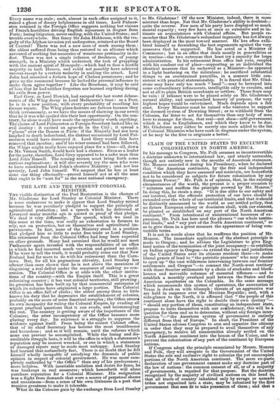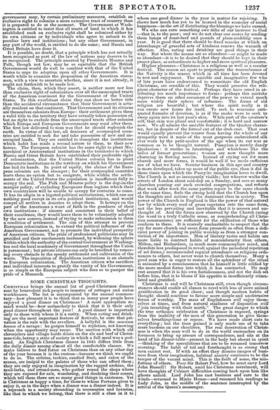CLAIM OF THE UNITED STATES TO EXCLUSIVE COLONIZATION IN NORTH
AMERICA.
IN his message to Congress, Mr. Polk assumes as incontrovertible a doctrine unknown to international law, and utterly untenable, though not entirely new in the mouths of American statesmen. Mr. Monroe asserted it during his Presidency, when he declared that "the American continents, by the free and independent condition which they have assumed and maintain, are henceforth not to be considered as subjects for future colonization by any European Power." Mr. Polk is of opinion, that, in the existing circumstances of the world, the present is a proper occasion to "reiterate and reaffirm the principle avowed by Mr. Monroe." In doing this, he steals a step. "It is due alike to our safety and our interest, that the efficient protection of our laws should be extended over the whole of our territorial limits, and that it should. be distinctly announced to the world as our settled policy, that no future European colony or dominion shall, with our consent, be planted or established on any part of the North American continent." From intentional or unintentional looseness of ex- pression, Mr. Polk has here used the phrases " our whole territo- rial limits," and "any part of the North American continent," so as to give them in a great measure the appearance of being con- vertible terms.
It is not in words alone that he reaffirms the position of Mr. Monroe. The immediate application of the abstract principle is made to Oregon ; and he advises the Legislature to give Eng- land notice of the termination of the joint occupancy—to establish an Indian agency in Oregon—to extend the laws and jurisdiction of the United States over its citizens resident there—to make liberal grants of land to "the patriotic pioneers" who may choose to open up "the vast wilderness intervening between our frontier settlements and Oregon "—to connect the North-west territory with those frontier settlements by a chain of stockades and block- houses and moveable columns of mounted riflemen— and to establish a monthly :overland mail between the States and the American squatteries on the Columbia. In the same message which recommends this system of operations, the annexation of Texas is dwelt on with triumph : threats of an aggressive war are held in suspense over the Mexican Republic ; and, with a side-glance to the North, it is affirmed that "the people of this continent alone have the right to decide their own destiny "— " should any portion of them, constituting an independent state, propose to unite themselves with our confederacy, this will be a question for them and us to determine, without any foreign inter- position "—" the American system of government is entirely different from that of Europe." In short, the President of the United States advises Congress to arm and organize the citizens in order that they may be prepared to avail themselves of any emergency, to receive all communities already settled on the North American continent into the bosom of the Union, and to prevent the colonization of any part of the continent by European nations.
If Congress adopt the principle enunciated by Messrs. Monroe and Polk, they will arrogate to the Government of the United States the sole and exclusive right to colonize the yet unoccupied portions of the North American continent. The mere ex-parte declaration of one government cannot make any doctrine part of the law of nations : the common consent of all, or of a majority of governments, is required for that purpose. But the doctrine recognized by the majority of civilized nations on this head is, that all tracts of country inhabited only by savage or nomads tribes not organized into a state, may be colonized by the first government that sees fit to take possession of them ; and that a
government may, by certain preliminary measures, establish an exclusive right to colonize a more extensive tract of country than it is prepared to do at the moment. The Government at Wash- ington is entitled to insist that all tracts of land to which it has established such an exclusive right shall be colonized either by its own citizens or by individuals who agree to submit to its peculiar laws and institutions ; but any other Government, in any part of the world, is entitled to do the same ; and Russia and Great Britain have done it.
It is possible, no doubt, that a principle which has not actually been recognized as part of the law of nations may deserve to be so recognized. The principle asserted by Presidents Monroe and Polk, though not law, may be so equitable that the British Government would do well to combine with that of the United States to urge its adoption upon all other Governments. It is worth while to examine the proposition of the American states- men, with a view to ascertain whether, since it is not already, it ought not forthwith to be made law.
The claim, then, which they assert, is neither more nor less than exclusive right of colonization over all the unoccupied tracts of the American continent for the Government of the United States. To this exorbitant claim they can show no better title than the accidental circumstance that their Government is actu- ally resident on that continent. That Government and its citizens are themselves colonists from Europe : their settlement gives them a valid title to the territory they have actually taken possession of, but no right to exclude from the unoccupied tracts other colonies which Europe and European Governments may send after them. The first law delivered to man was that he should replenish the earth. In virtue of this law, all denizens of overpeopled coun- tries are entitled to seek for and take possession of new and un- occupied lands. They are entitled to transplant the institutions which habit has made a second nature to them, to their new homes. The European colonist has the same right to plant Mo- narchical or Aristocratical institutions in the territories to which Russia and Great Britain have established their preferable right of colonization, that the United States colonist has to plant Democratic institutions in the territory on which his Government has laid its hands. In point of equity, the claims of the Euro- pean colonists are the stronger ; for their overpeopled countries leave them no option but to emigrate, while within the settle- ments of the United States the population is insufficient fully to occupy the soil. The Polk and Monroe policy is the dog-in-the manger policy, of excluding Europeans from regions which their own countrymen will be unable to occupy for centuries to come. It has its origin in a bigoted political sectarianism, which can see nothing good except in its own political institutions, and would compel all settlers in America to adopt them. It betrays on the part of the Americans a want of faith in the goodness of their own institutions : if sincere and consistent in their belief of their excellence, they would leave them to be voluntarily adopted by the new corners, instead of trying to make submission to them a condition of settlement. The aim of this attempt to prevent European colonization is, to extend the political influence of the American Government, not to promote the individual prosperity of American citizens. The pride of professional politicians may be gratified and their emoluments increased, by widening the sphere within which the authority of the central Government at Washing- ton and the local machinery of Government throughout the Union is paramount ; but private citizens can only be benefited by remov- ing every obstacle to the speedy settlement and cultivation of the waste. The imposition of Republican institutions is an obstacle to European colonization. The American citizen who sacrifices real individual interests to gratify the vanity of his Government, is as simple as the European subject who does so to pamper the pride of a Monarch.





























 Previous page
Previous page